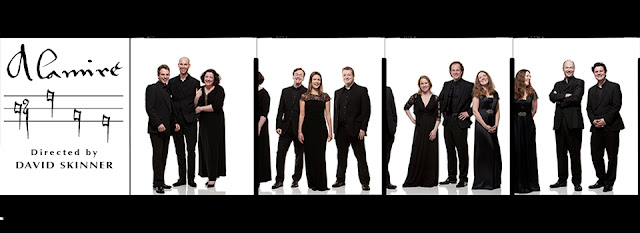The Anne Boleyn Songbook; Alamire, David Skinner, Clare Wilkinson, Jacob Heringman, Kirsty Whatley; Sam Wanamaker Playhouse
Reviewed by Robert Hugill on Sep 13 2015
Star rating:
An evocative window into the music at Henry VIII's court
The vocal consort Alamire, director David Skinner, brought their latest project to the Sam Wanamaker Playhouse on Sunday 13 September 2015 when the group performed music from the Anne Boleyn Songbook. This is an early 16th century manuscript choir-book which contains an intriguing mixture of Latin motets and three French consort chansons. A signature in the book 'Mistress ABoleyne nowe thus' associates it with Anne Boleyn and it seems to have been a collection that she made, starting when at the French court and continuing when she returned to England. Much of the music is anonymous and is Franco/Flemish with the attributed composers including Jean Mouton, Loyset Compere, Antoine Brumel, Claudin de Sermisy, Antoine de fevin and Josqin Desprez.
Reviewed by Robert Hugill on Sep 13 2015
Star rating:
An evocative window into the music at Henry VIII's court
The vocal consort Alamire, director David Skinner, brought their latest project to the Sam Wanamaker Playhouse on Sunday 13 September 2015 when the group performed music from the Anne Boleyn Songbook. This is an early 16th century manuscript choir-book which contains an intriguing mixture of Latin motets and three French consort chansons. A signature in the book 'Mistress ABoleyne nowe thus' associates it with Anne Boleyn and it seems to have been a collection that she made, starting when at the French court and continuing when she returned to England. Much of the music is anonymous and is Franco/Flemish with the attributed composers including Jean Mouton, Loyset Compere, Antoine Brumel, Claudin de Sermisy, Antoine de fevin and Josqin Desprez.
 |
| The Anne Boleyn Songbook |
Scholars have long argued over the significance of the manuscript, its contents and whether it is even associated with Anne Boleyn. David Skinner introduced the various works and in a lively, engaging and informed manner gave us the full background to the manuscript along with the current arguments in favour of its association with Anne Boleyn. The manuscript is fascinatingly multi-layered, having been created at various times by various hands, it seems to have been started when she was at the French court and then carried round with her and continued whilst she was in England right up to the period when she was being courted by Henry VIII. David Skinner's introduction brought the story to life and helped to turn what could have been simply a recital of early 16th century Franco-Flemish polyphony into something strikingly particular.
But of course, what really counts is to perform the music and Skinner and Alamire gave us a fine chance to appreciate the riches in the manuscript. They performed 12 of the 39 motets, plus all three of the chansons. With one exception, the sacred music is Franco-Flemish and there were some notable gems, all performed in stylish and vibrant performances. The group made quite a strong sound, bringing out the richness of the part writing in the music. The anonymous Forte si dulci had a text which intriguingly united Christ to the Greek Gods. Antoine Brumel's Sicut lilium was calmly beautiful whilst Antoine de Fevin's Tempus meum was vigorously up tempo. An anonymous Popule meus was sombrely moving, but the most striking work was Josquin's six-part Prater rerum seriem, which was an amazingly strong dark piece.
Clare Wilkinson sang the chansons with a beautifully poised manner using some period pronunciation and with supportive accompaniment from Jacob Heringman on lute and Kirsty Whatley on the intriguing sounding harp. After a reading of Ann Boleyn's final letter to Henry, Clare Wilkinson then sang O Deathe rocke me asleep, a song not in the manuscript but long associated with Ann Boleyn. With its repeated use of false relations, it made a poignant close to a fascinating and illuminating evening.
Elsewhere on this blog:
- Monteverdi's L'Orfeo from Jordi Savall - CD review
- Exploding with joy: Choir of Gonville and Caius College at Kings Place Festival
- The passions are the same: My encounter with Christophe Rousset - interview
- Handel survey: Handel in Italy from Bridget Cunningham - CD review
- Charm and delight: The Cunning Little Vixen from British Youth Opera - opera review
- Technology and class in the development of opera and concert-going - feature article
- Missed opportunity: Prom 65, Alice Coote in Handel - concert review
- Colour and Drama: Mozart and more from Anneke Scott and Ironwood - CD review
- An Avila Diary: My adventures singing triple-choir music by Victoria and Vivanco under Peter Phillips in Spain - feature article
- Serious, independent, fascinating: Music by Edward McGuire from Red Note - CD review
- Charm: Wolf-Ferrari's Suite Veneziana - CD review
- Undeservedly forgotten: Music by Roger Sacheverell Coke - Cd review
- Wartime consolations: Linus Roth plays music by Weinberg and Hartmann which deserves to be heard
- Towering achievement: Beethoven's Diabelli Variations from Nick van Bloss - CD review
- Family connections: Alissa Firsova Russian Emigres - CD review
- Volume 5 of Malcolm Martineau's survey of Poulenc Songs - CD review
- Home




.jpg)
%20Ali%20Wright-28.jpg)
.jpg)





No comments:
Post a Comment